Permissions
The Permission tab provides control over the the operations which responsible parties and task managers are capable of. Permissions may be established for 2 types of end-users - Responsible parties (Assignee) and Task managers (users that have a right to manage the tasks).
The Permissions tab becomes active when responsible parties have been selected on the Basics tab.
The article covers all permission features for Responsible parties and Task managers.
Permissions for Responsible Parties
These permissions define what responsible parties can do with the tasks assigned to them.
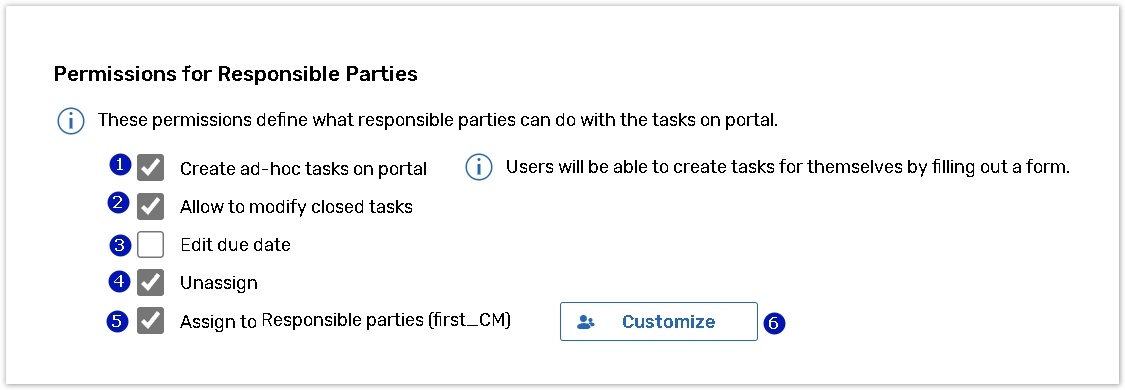
Create ad-hoc tasks on portal allows Responsible parties to create tasks by themselves on the portal. If a contact is not a part of the Responsible parties, they will not be able to create tasks on the portal.
Allow to modify closed tasks, if checked, allows the assignee to change the status of the closed task assigned to them, edit the attached form record of a closed task and perform actions granted in the permissions list below.
Edit due date checkbox is only visible if the task has Require due date toggle turned on. If checked, this option will allow the assignee to change the due date of the task.
Unassign option allows responsible parties to make tasks that are assigned to them unassigned.
If you select the Assign to other Responsible parties option, the Customize (6) button will appear. If you click on that button, the dialog box will pop up allowing to configure settings for a contact group
.png?inst-v=02bfe947-c373-4d33-ba91-0171b9ed4f97)
The dialog allows you to customize your contact selection, provide a unique group name in the Group Name field, and create a customized filter. Please read the Basicstab articles for more details.
The dialog box functions similarly to the one that appears after pressing the Customize button in the Responsible Parties section of the Basics tab. It allows the assignee to reassign the task to another party from the customized group of contacts.
In addition to the Basics tab filter customization functionality, there is also the ‘Dynamic Condition’ tab.
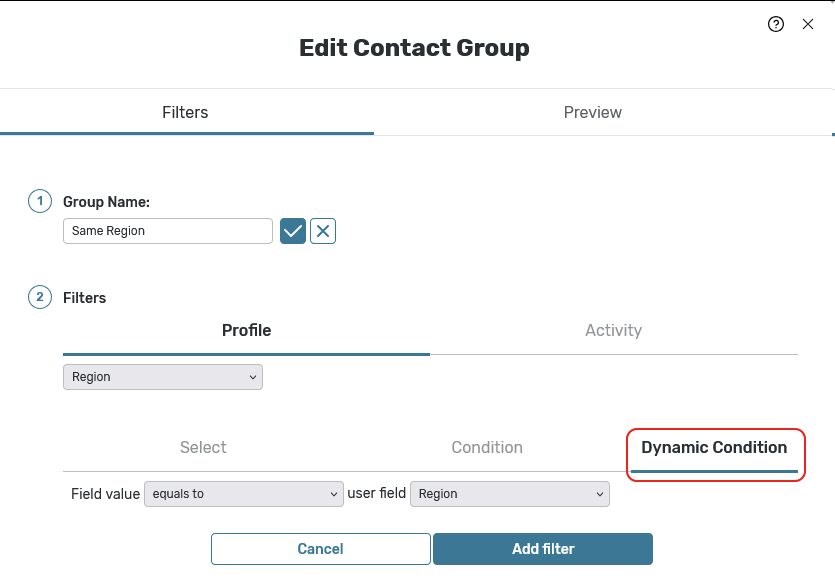
It allows you to set up the dependency between 2 profile criteria.
If you do not want Portal users to create a task by themselves, do not check the Create ad-hoc tasks on portal box on the Permission tab.
Permissions for Task Managers
The functionality controls which portal users should have access to tasks through the Task Management functionality. It also determines if they can view and re-assign such tasks using complex filters that would allow to define user groups to apply the permissions for, define permissions and in case of re-assigning, define for which groups of users the reassignment is possible.
To add permissions for Task managers:
Click on the Add permissions button.

In the pop-up Select contact group window, choose a group of contacts for whom you would like to set up permissions, and click the Save button. Press the Customize button to apply filters to the selected group.
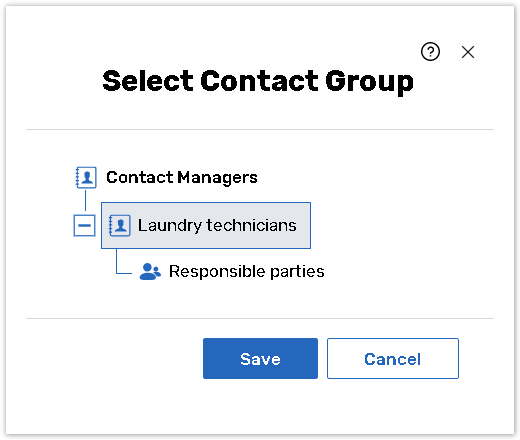
Select the permissions.
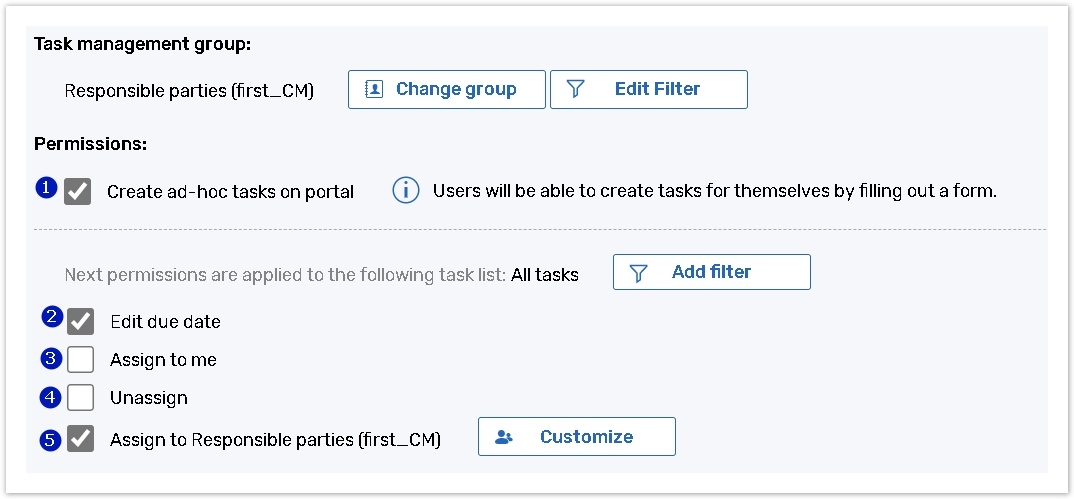
1.You can allow your Task Managers group to create a task by themselves on the portal. Check the Create ad-hoc tasks on portal box to enable the function;
2. Edit due date enables task managers to modify the due date of a task.
3. Assign to me allows task managers to assign the task to themselves.
4. Unassign allows task managers make tasks unassigned.
5. If you select the Assign to other Responsible parties option, the Customize button will appear. If you click on that button, the dialog box will pop up allowing to configure settings for a contact group.
Filter for tasks
You can set up the filter for tasks for which the permissions are being set up. By default, all tasks are selected for the permission setting. However, you can customize the tasks that should be included into the permission rule.
Click on the Add filter button.

The system displays the Edit task list dialog. Now you can set up a group of logical expressions and use logical conditions between the groups. This functionality is identical to the same functionality of the Advanced Logic editor.
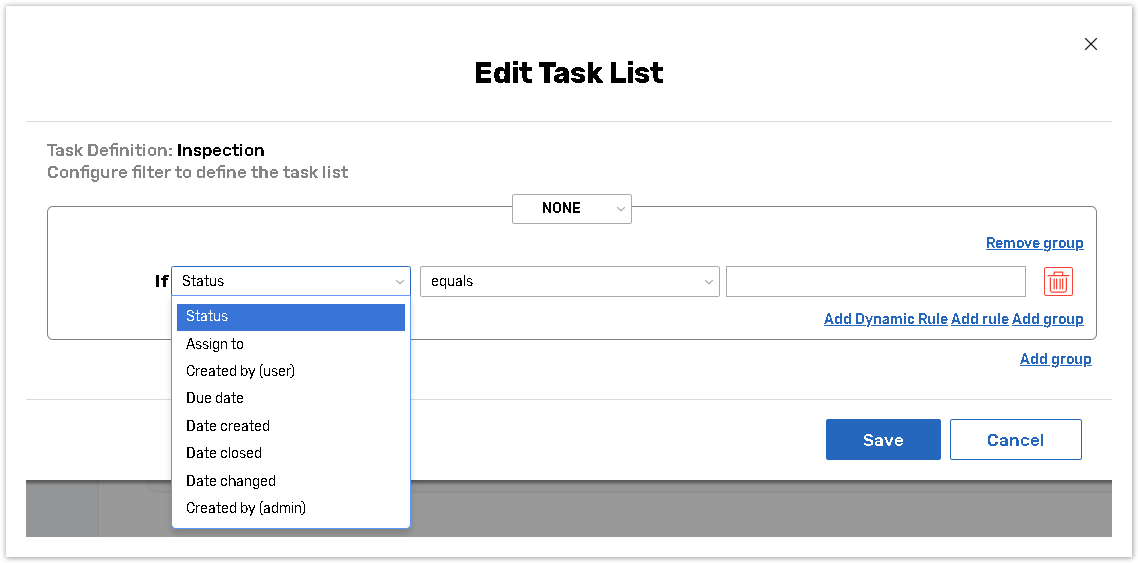
You can filter the tasks by creators, assignees, date created/changed/closed, statuses and due dates.
Here is the list of all available filters:
Status
Equals/Does not equal - applicable to the status selected in the third dropdown.
The Select value field is based on the Status' which have been previously created.
Assign to
Unassigned/Contact - applicable to the selection in the third dropdown.
The selected contact can only be selected from the Contact Manager assigned.
Created by (user)
Contact selection dropdown - applicable to a contact selected in the second dropdown.
The selected contact can only be selected from the Contact Manager assigned.
Due date
equals
does not equal
is earlier than
is earlier than or equal to
is greater than
is greater than or equal to
All options are applicable to the Date selected from the Calendar in the the third field.
Date created
equals
does not equal
is earlier than
is earlier than or equal to
is greater than
is greater than or equal to
All options are applicable to the Date selected from the Calendar in the the third field.
Date closed
equals
does not equal
is earlier than
is earlier than or equal to
is greater than
is greater than or equal to
All options are applicable to the Date selected from the Calendar in the the third field.
Date changed
equals
does not equal
is earlier than
is earlier than or equal to
is greater than
is greater than or equal to
All options are applicable to the Date selected from the Calendar in the the third field.
Created by (admin)
select the contact which is the Account admin
After you are done setting up logical rules or groups of rules, press the Save button.
The scope of permissions that the selected task managers can be established from the Configure permissions section.
